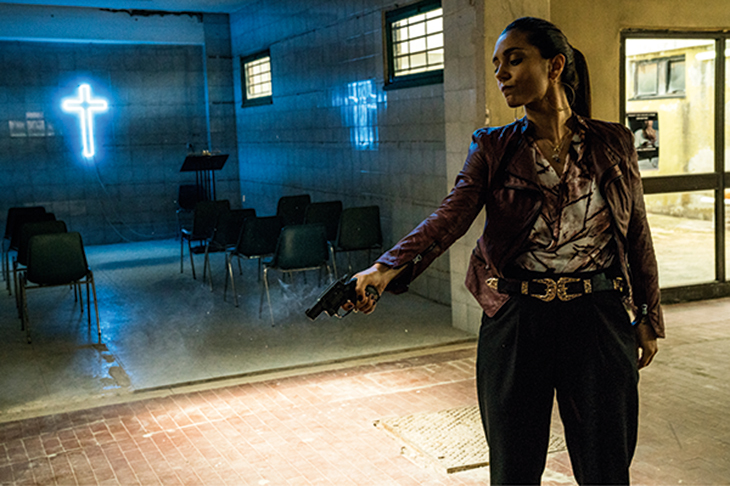My favourite epithet about my favourite TV series was the headline in a review by the Irish Times: ‘Gomorrah. Where characters die before they become characters.’
The review appeared to suggest that this was a bad thing. But I disagree. What made Game of Thrones so original and compelling, especially in the early seasons, was its refreshing willingness to break convention by murdering key players at the drop of a hat. Gomorrah (Sky Atlantic) merely pushes that troubling edginess a step further: whether you’re the head of the Neapolitan mob, an adorable, cute child, or just some random, decent civilian briefly introduced in vignette, there is never a guarantee that you’ll survive the episode. So, just like in the brutal, amoral mob universe of the Camorra it depicts, you the viewer can never feel comfortable or safe.
Some of the killings — often preceded by torture — are so heartbreaking you half-wonder how decency could possibly allow such horror as TV entertainment. There’s one in particular that will haunt me forever where a pretty, totally innocent girl is beaten within an inch of her life by a character who, up till then, you’d considered sympathetic. No one is punished. It’s just another of those senseless things that happens in this very religious but godless universe.
And that’s the point. The reason that Gomorrah is one of the best series ever shown on TV is its uncompromising fidelity to the truth. Sure, its mob drama predecessors — The Godfather trilogy, Goodfellas, The Sopranos, et al — haven’t exactly shied away from depicting hair-trigger ultra-violence. But there’s nothing in any of them to match the amorality, the unrelenting bleakness or, quite, the echtness of Gomorrah.
Now in its fourth season, the series is a fictionalised version of a tell-all true-life bestseller by Roberto Saviano, a local journalist who now lives under police protection in the US because of threats from one of the Camorra cartels. Initially — just like the Mafia did with The Godfather — they basked in the attention. Then they changed their mind, perhaps because it so deglamourises their trade.
With Goodfellas, you wouldn’t have much minded hanging out with Henry Hill, at least when times were good and the money and booze were flowing. There’s never such respite with Gomorrah. Even when they’re celebrating, no one’s truly happy or at peace (not least because weddings and other social gatherings are such an obvious target for a hit by rivals); even though they make millions from the drugs trade, there’s little to spend it on save fleets of armoured 4x4s and gilded cages — apartments furnished at great expense in the worst possible taste, but located in rundown neighbourhoods they can never leave because though they are princes and princesses in their own manor (addressed as Don and Donna), they are nobodies — corpses or jailbirds — the moment they step outside.
I haven’t made it sound much fun. After the first episode, I must admit, I decided it was so grim I wasn’t going to bother. But after various entreaties from Twitter enthusiasts I gave it another go and now I’m a total addict. The reason I haven’t broached much by way of plot is that I don’t want to give away spoilers. If I mention who is still around in Season 4 you’ll know who has been offed — everyone, pretty much, is all I’m saying — in the three preceding it and that would be a shame.
What keeps you going — apart from the obvious ‘Who’s going to get it next?’ — is the absolute integrity of its every detail. The cast (where do they find such talent?) is first rate; the dance/hip hop soundtrack by Mokadelic is an earworm you’ll never resent; the set pieces — especially now that the series is established and presumably has more money to play with — are exquisitely shot in locations which though not always lovely are stunningly atmospheric; the narrative arcs resemble Shakespearean tragedy in their terror, their pity and their transcendent magnificence and labyrinthine complexity; and the characters, though almost never wholly sympathetic, are gripping, fully rounded and superbly imagined.
Occasionally there’s a lull. But some episodes, like the one where the devout and flamboyant Mummy’s boy mobster Salvatore Conte whips himself ritually in a penitential religious procession, or the one where the magnificent Ciro di Marzio undergoes a redemptive quest, are so inspired, so note-perfect that they surely rank among the best screen drama there has ever been. So stick with it. You’ll thank me later.
Got something to add? Join the discussion and comment below.
Get 10 issues for just $10
Subscribe to The Spectator Australia today for the next 10 magazine issues, plus full online access, for just $10.
You might disagree with half of it, but you’ll enjoy reading all of it. Try your first month for free, then just $2 a week for the remainder of your first year.















Comments
Don't miss out
Join the conversation with other Spectator Australia readers. Subscribe to leave a comment.
SUBSCRIBEAlready a subscriber? Log in